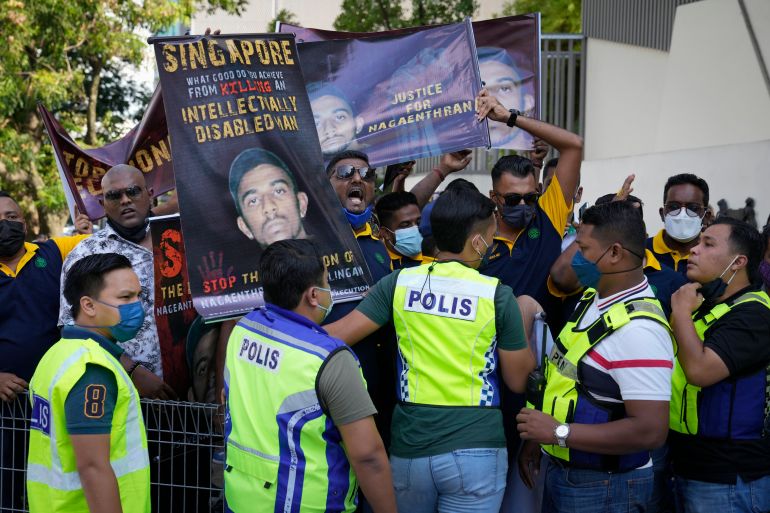Branson declines Singapore’s invite to death penalty debate
Singapore had invited Richard Branson to a televised live debate after he criticised the city state’s use of the death penalty as brutal and disproportionate.

British billionaire Richard Branson has declined Singapore’s invitation to debate the city state’s drug policies and death penalty on live television.
Branson, who had lobbied against Singapore’s decision to execute a Malaysian man convicted of drug trafficking in April, said on Monday that a televised live debate “cannot do the complexity of the death penalty any service”.
Keep reading
list of 4 itemsSingapore tightens property curbs to cool demand
Heterosexual marriage definition a concern for gay Singaporeans
Singapore will decriminalise sex between men, says prime minister
The conversation, he said, also needed local voices.
Singapore’s Ministry of Home Affairs had extended the invitation to Branson earlier this month when the Virgin Group founder published a blog post titled What’s the matter with Singapore, that condemned its “stubborn use of the death penalty, particularly for drug offences”.
In that post, Branson had criticised Singapore’s execution of Nagaenthran Dharmalingam, a Malaysian man with learning disabilities who was sentenced to death for carrying 42.72 grammes (1.5 ounces) of heroin across the border, saying: “Singapore’s government seems bent on executing scores of low-level drug traffickers, mostly members of poor, disadvantaged minorities, whilst failing to provide clear evidence that it has any tangible impact on drug use, crime or public safety.”
He added: “It’s a disproportionate, brutal response”.
The ministry rejected Branson’s comments, saying it did not accept that anyone in the West was “entitled to impose their values on other societies”. It then offered to fly the tycoon to Singapore for a debate with Home Affairs Minister K Shanmugam to present why the country should do away with laws it said had kept it “safe from the global scourge of drug abuse”.
Turning down that invitation, Branson said on Monday that the “brave thing” for Singaporean officials to do would be to engage with local activists.
“They deserve to be listened to, not ignored, or worse yet, harassed,” he said in a letter posted on the Virgin website.
“A television debate – limited in time and scope, always at risk of prioritising personalities over issues – cannot do the complexity of the death penalty any service,” he said. “It reduces nuanced discourse to soundbites, turns serious debate into spectacle. I can’t imagine that is what you are looking for. What Singapore really needs is a constructive, lasting dialogue involving multiple stakeholders, and a true commitment to transparency and evidence.”
He added that abolition of the death penalty was not a “Western concept imposed on the rest of the world”.
“This is about universal human rights and humanity’s shared aspiration to advance equality, justice, dignity, and freedom everywhere, for everyone.”
Singapore has some of the world’s toughest anti-narcotics laws and insists the death penalty remains an effective deterrent against trafficking. But the United Nations says that the death penalty has not proven to be an effective deterrent globally and is incompatible with international human rights law, which only permits capital punishment for the most serious crimes.
Singapore resumed hangings in March after a hiatus of more than two years.
It has executed at least 11 people since then, according to the Transformative Justice Collective, a group of Singapore activists that records executions, which are not announced by the authorities.
Activists in Singapore have described their government’s invitation to Branson as a sideshow.
“I think the invitation to debate on live TV was always more about political theatre than any sincere desire on the part of the Singapore government to engage with an open mind,” activist Kirsten Han told the AFP news agency.
“Why would the government consider Richard Branson to be more worthy of a response than the families of death row prisoners and the Singaporeans who stand in solidarity with them?”